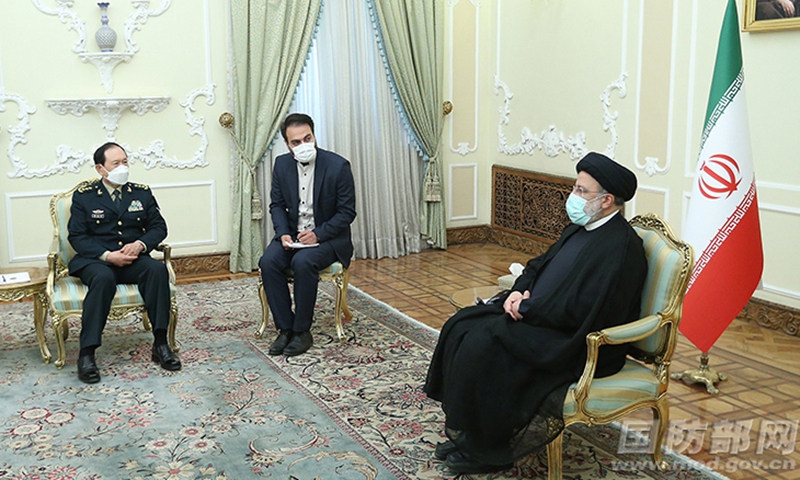
Chinese State Councilor and Minister of National Defense Wei Fenghe (left) met with Iranian President Ebrahim Raisi (right) on April 27, 2022. Photo: The Chinese Ministry of National Defense
Chinese State Councilor and Minister of National Defense Wei Fenghe met with Iranian President Ebrahim Raisi on Wednesday and both sides agreed to further deepen cooperation in military and other areas, during a rare visit by the Chinese Defense Minister to Iran that experts say could help elevate China-Iran military ties to an unprecedented level against the backdrop of an increasingly hostile US and a tumultuous global situation.
Wei's trip to Iran marks the highest-ranking Chinese official visit to the Middle East country since the implementation earlier this year of the 25-year Comprehensive Cooperation Agreement between China and Iran, a sweeping deal to further improve bilateral political and economic ties between the two countries - both are facing intensifying hostility from the US.
During the meeting on Wednesday, Raisi called for expanding the areas of cooperation between the two countries and strengthening all-round cooperation, including in the military field. After the meeting, they reached consensuses on expanding high-level strategic communication, deepening military exchanges and conducting joint exercises and personnel trainings, Xinhua reported.
Iran, which opposes unilateralism, hegemonism and external interference, firmly supports China in safeguarding its core interests, Raisi said, while expressing gratitude to China for its long-standing support and assistance during Iran's difficult times, according to Xinhua.
For his part, Wei said that his visit to Iran, which came against the backdrop of the current turbulent international situation, reflected the importance of China-Iran relations, their firm mutual support and joint progress. The Chinese military is willing to maintain strategic communication with Iran, make good use of the cooperation mechanisms, and boost pragmatic collaboration, so as to lift bilateral military ties to a higher level, Wei said.
The two sides also had an in-depth exchange of views on the regional and international security situations, Iran's nuclear issue and the situation in Ukraine.
Hua Liming, former Chinese ambassador to Iran and an expert on Middle East affairs, told the Global Times on Thursday that "both China and Iran are targets of US hegemonism. I think this is the most important common language between the two countries."
Commenting on the consensus reached on military cooperation, Hua said such detailed military communication and cooperation with Iran, a major power in the gulf region is unprecedented. Hua noted that there have been military contacts between the two sides over the past 50 years since the establishment of diplomatic ties between China and Iran, but substantive exchanges have been few, with mutual visits or observing each other's exercises having been the most common exchange.
Li Weijian, vice president of the Chinese Association of Middle East Studies, told the Global Times that Wei's visit comes at a time when the US continues to instigate regional tensions such as the Ukraine crisis, but the outcome of the visit shows that US meddling has not affected China and Iran to further elevate their bilateral ties and cooperation in a wide range of areas.
Among the key areas of cooperation is anti-terrorism effort, as terrorism is on a rising trend obscured by major power struggles and the COVID-19 pandemic, analysts noted.
China and Iran can strengthen counter-terrorism cooperation and enhance regional security and stability within the Shanghai Cooperation Organization (SCO) framework and at the bilateral level, Qian Feng, director of the research department at the National Strategy Institute at Tsinghua University, told the Global Times.
Before Iran, Wei also visited Kazakhstan and Turkmenistan - both are SCO members - and counter-terrorism cooperation was a common theme of the Chinese defense minister's trips to the countries.
Wei's trip to Iran also came as China is deepening ties with various countries in Central Asia and in the Middle East, in a bid to jointly promote regional peace and stability, as the US is seeking to stir up more geopolitical tension in the region and around the world, analysts said.
Middle East countries like Iran have a great need to import weapons from other countries and we can have deeper cooperation in all aspects of the defense industry to safeguard regional peace and stability, not for other purposes, Zhu Weilie, director of the Middle East Studies Institute at Shanghai International Studies University, told the Global Times.
Iranian Foreign Minister Hossein Amir-Abdollahian who had visited China in January expressed high hopes for the two countries to continue their half century of diplomatic relations and continue to push forward cooperation in various domains in an article published on the Global Times.
Also in January, the foreign ministers of four Middle Eastern countries - Saudi Arabia, Kuwait, Oman and Bahrain - as well as Gulf Cooperation Council (GCC) secretary general paid a visit to China.
But in stark contrast to the US, in cooperation with these countries, China is not seeking to establish spheres of influence or fill the vacuum left by the US in the region; instead, it is simply trying to work with countries in the region to maintain regional peace and stability, Zhu said.




